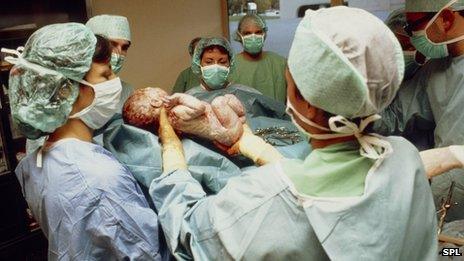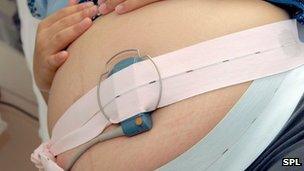Making childbirth safer and easier for women
- Published

Difficult labours can often lead to an emergency caesarean birth
Why do some women have easy births while others have long, traumatic labours that end with an emergency delivery?
Scientists don't know the answer - but they are working on it.
Investigating how the womb works is the priority at a new research centre dedicated to understanding the problems experienced in childbirth and labour.
That knowledge, researchers say, will help them learn more about premature labour, miscarriage, stillborn babies and why emergency caesarean births have risen by almost 50% in the last 30 years.
Every woman knows a friend who has been through a difficult birth.
The Birth Trauma Association says that 10,000 women a year in the UK develop post traumatic stress disorder following the birth of their child.
The charity estimates that as many as 200,000 women may also feel traumatised by the experience.
Professor Susan Wray, director of the Centre for Better Births at Liverpool Women's Hospital, external, recognises that many women have gone through hell during childbirth.
"If we were talking about another organ [apart from the womb], we wouldn't put up with it," she says.
A team of 20 scientists, postgraduates and doctors are looking at how contractions of the womb are regulated and controlled.
Armed with this knowledge, medics could find new ways of helping women whose labour is not progressing as it should.
"We need to have predictors - when it will be a difficult birth, when a woman might go into early labour, for example," Prof Wray says.
"There are bio markers for some diseases, like breast cancer - we need to do the same thing for pregnancy."
Predictors needed
Scientists at Liverpool have already discovered that the level of lactic acid in the uterus and the bloodstream dictates the success of natural birth.
This suggests that if the uterus was "rested" the body might overcome some of the contraction problems caused by excess acid.
One of the main research projects at the new centre is looking at why a high proportion of women expecting twins go into labour before 37 weeks' gestation, known as preterm labour.
Funded by the children's charity Sparks, external, research is focusing on how the uterus of a mother of twins differs from a single-baby uterus.
This could eventually lead to new drugs for preventing the onset of early labour and help reduce the numbers of babies born prematurely, currently about one in every 13.
Creating a blood test that predicts which women are at risk of giving birth prematurely is the holy grail, Prof Wray says.
All these strands of research will help clinicians understand why labours go wrong sometimes, but there can be no guarantee that all women will have an "easy" birth.
When women are regularly giving birth to bigger babies well into their 30s and 40s, which creates more complications in pregnancy and labour, that is unrealistic.
'Holy grail'
Maureen Treadwell, from the Birth Trauma Association, believes promoting natural births all the time is not helpful.

Monitoring the foetal heartbeat before labour begins
"Most of these women who have emergency caesareans are identifiable. They could have been predicted.
"We should be engaging women, giving them honest and realistic information to make decisions about how they want to give birth.
"It shouldn't be be imposed on her."
Ms Treadwell says the centre's research into why one in five pregnancies ends in miscarriage every year "can only be a really brilliant thing".
The centre, which forms part of the University of Liverpool, is also looking at how obesity and diabetes can affect women in labour and the mechanics of endometriosis - a painful gynaecological condition.
These areas have traditionally lacked resources to fund research, says Prof Wray.
"It will be a hub for training the next generation of scientists so that we continue to advance our knowledge and prevent problems in pregnancy and labour for women and families across the globe.
"Scientists need to know more about what happens during the labour process.
"Haven't enough women and families suffered to say this isn't working?"
- Published17 November 2012
- Published29 August 2010
- Published14 March 2013